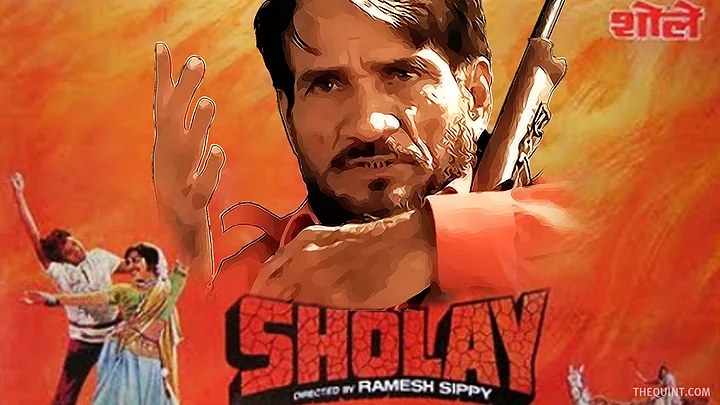It’s Indian cinema’s grand-daddy of all blockbusters. And neither its helmsman Ramesh Sippy nor its sidebar character Mac Mohan could ever top that act.
Sippy, for the sheer magnum-scope of the 1975-released Sholay, and Mac for the deceptively innocuous line, “Poore pachaas hazaar”, a terse response to Boss Gabbar Singh’s enquiry, “Kitna inaam rakhen hain sarkar hum par?”
What is all this fuss over just Rs 50k? But remember this was eons ago. And it was just one of those throwaway Salim-Javed lines of dialogue which became an imperishable quotable quote in Bollywood’s lexicon.
Till date, Sippy continues to be badgered, “But why couldn’t you ever do another Sholay?” Sambha was finally spared of similar jibes, when he passed away at the age of 72.
Now, if the Karachi-born Makijany Mohan, aka Mac Mohan – frequently called Mac in his film roles – had survived a lung tumour, he would have been a year older today (24 April).
From an Aspiring Cricketer to a Bollywood Villain
Initially, the willowy actor with hawk eyes, forest-thickbeard and backcombed hair with flashes of grey had aspired to become a cricketer. The field wasn’t wide open. Movies were the next option. Following a spell of assisting Chetan Anand and acting in the war drama Haqeeqat (1960), Mac Mohan began his innings in front of the camera in earnest – mostly in roles which could be comparable to that of a cricket team’s 12th man.
Villainy, according to Bollywood, thrived in a hierarchy. A major domo called the shots – enacted most famously by Pran, Ajit, Prem Chopra, occasionally Jeevan, Jayant, Madan Puri, Danny Denzongpa and Amrish Puri.
Next came the big baddy’s hench guys. These were executors of foul deeds and the dependable, “Yes boss! Waah waah boss!” echo chambers.
Mac Mohan found a home in this sub-strata, looking appropriately deadly against the background of those shady studio caverns. A natty dresser in bespoke costumes comprising three piece suits, cool Pathanis and an assortment of baggies, the character actor was a palpable presence, but never a leader.
Low Profile
The Hall of Ill-Fame has included Ranjeet (the evil smuggler’s equally evil scion, given to sexual assault), Shetty (his bald pate shone as a forewarning of cruelty to come), Sudhir (reducing threatening dialogue to mince meat), expatriate Bob Christo (for a dash of brewed-in-Australia poison), and Yusuf Irani (the scene-stealing Zabisko of Amar Akbar Anthony and John Ragada of Bombay to Goa).
Countless such fearsome fringe dwellers have been forgotten, a fate which might have befallen Mac Mohan too if it weren’t for Sholay which has a mega-cult following across generations.
Like Ranjeet and Sudhir, Mac Mohan was prolific, and did have his moments of glory as a coal mine worker who becomes a martyr in Yash Chopra’s Kaala Patthar, not to forget the sharper visibility in the Amitabh Bachchan hits – Majboor, Satte pe Satta and Don. ‘Mac’ was always there, but taken for granted.
At the Filmfare desk, staffers groaned on being assigned a Q&A with the burly Goga Kapoor or Joginder Shelly, the confectioner of B-grade quickies like Ranga Khush. Surprise, surprise, the reporters returned pleased. Goga Kapoor claimed that he was responsible, unequivocally, for Amitabh Bachchan’s success. And Joginder Shelly insisted that there was a time when Prime Minister Indira Gandhi treated him like “her own son. Write badly about me, and you’re finished.” Whoa!
Mac Mohan was so low-key that he didn’t make for a spicy copy. But after decades of politesse he did speak out in print. He was upset with the very notion of a Sholay remake by Ram Gopal Varma and described RGV as a “businessman.”
Share of Controversy
And he could be self-critical, admitting that he had to travel from Mumbai to the Bengaluru outskirts 27 times to get that, “Poore pachaas hazaar” the way the director wanted it.
The only time I caught a glimpse of Mac Mohan was when a controversy erupted around 2000. He was on the National Award jury. A section of the jurors protested against the Best Actress Award for Raveena Tandon in Daman.
It was pointed out that Mac Mohan was her maternal uncle. In self defence, before the press, he had argued that he had abstained from voting for that particular category. Subsequently, there were allegations that then MP Amar Singh had ‘influenced’ the jury. To an extent, Mac was exonerated.
Such niggling incidents apart, Mac Mohan was perhaps too good to be bestially bad on screen. To get to the Villain No. 1 echelon, he needed another chance, another innings.
(This article is from The Quint’s archives and was first published on April 24, 2016. It is now being republished to mark Mac Mohan’s birth anniversary.)
(At The Quint, we question everything. Play an active role in shaping our journalism by becoming a member today.)
